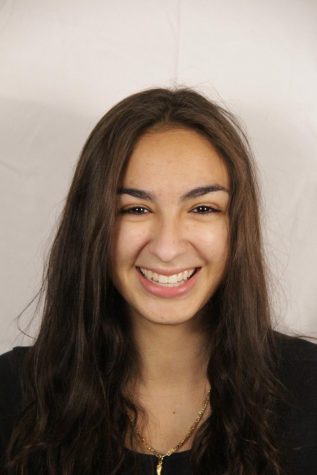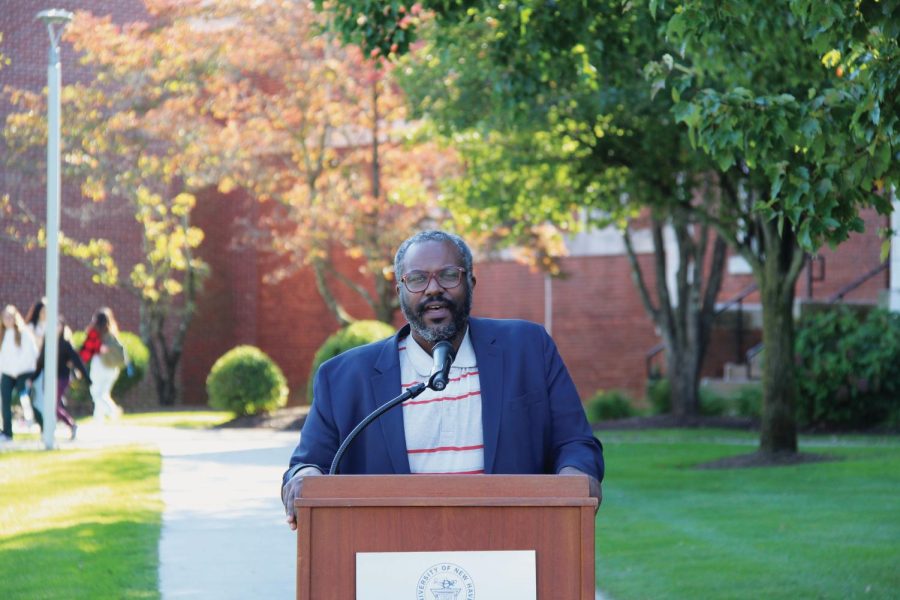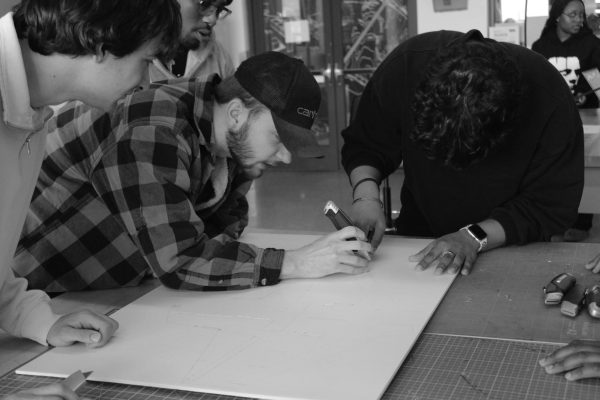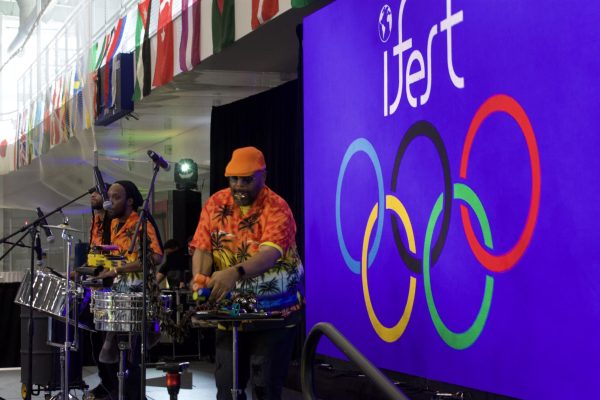Myatt Center’s new director charges into their latest DEI role
Photo courtesy of Charger Bulletin/Amber Cholewa.
New Myatt Center Director Khristian Kemp-Delisser addresses university community at Indigenous People’s Day, West Haven, Oct. 10, 2022.
On Oct. 10, the Myatt Center for Diversity and Inclusion (MCDI) welcomed the new director to their diversity, equity and inclusion (DEI) team. Khristian Kemp-Delisser voiced high enthusiasm and spoke on their depth of insight entering this role. As a figure with a background of work in racial and LGBTQ+ identity centers, they are excited to enter their newest role in diversity work.
With diversity work, they said that it “always starts from the inside out.” Kemp-Delisser spoke on how they have constructed spaces where they could learn more about their identity, and foster that learning for others, especially in places where they previously did not exist.
“The personal is professional,” Kemp-Delisser said about the overlap in the passion behind their work in the realm of DEI.
Considering what drew Kemp-Delisser to the University of New Haven, they said that “There’s a lot of folks on campus who are both formally by job title, but also by interest and affinity, that are already working on promoting diversity, equity and inclusion here on campus.” In contrast, “I was the first director of multicultural affairs at UB [the University of Bridgeport], and it got lonely, being the only person who was accountable for diversity in their title.”
“It’s a built-in family; it’s a built-in team to join– how could I resist? I really find that you can’t do DEI in isolation,” Kemp-Delisser spoke repeatedly on the value of collaboration when approaching diversity, equity and inclusion. They voiced appreciation in being part of a group of advocates at the university.
They voiced excitement to be able to sit down and speak with other figures of authority and contribute perspective to coordinate DEI improvements on campus.
“I think for a new member of the community like me, I can’t turn down any invitation,” Kemp-Delisser said. “I have to use as many opportunities as I can to introduce myself.”
In prior work in DEI, Kemp-Delisser relied heavily on connections and relationships to make strides in the educational setting.
In regards to potential growth in DEI work, Kemp-Delisser said that “once people realize what is possible they will see room for more and more opportunity.” They voiced that there is always room for more within the organization, as DEI positions seek constant growth.
They also voiced an understanding that the Myatt Center is often looked at as a leading voice for diverse populations on campus, and said that “I’m glad it carries so many expectations.” They want to work to further ensure a “reliable presence” for the center.
Kemp-Delisser is excited to be an additional contributor to the infrastructure surrounding DEI work at the University of New Haven, and is still working on building their vision, as “I feel like I’m still learning from folks on campus what they feel needs to be done and what they see as necessary progress. My vision will come out of those conversations and out of those relationships that I will be building.” They said that they want people to “see themselves reflected” in their missions and goals going into this role.
Kemp-Delisser also discussed their outlook on the MCDI working as an agent to connect different branches of advocates for different groups across the university in order to have “pockets of diversity work” be synthesized to “work in concert” under a cohesive framework. Kemp-Delisser finds power in a united voice when advocating for changes within the university community.
They are very enthusiastic about forming relationships with the student body, and said that their philosophy is “I like to say that I’m your neighbor.” Kemp-Delisser voiced the value in being part of the community, even living in close proximity to where they work and not just a figure in administration.
This would allow them to build a bigger visibility by spending as much time on campus as possible. Kemp-Delisser wants to be present at events and programs held on campus, being present in the activities beyond the policy work that is within the realm of their role.
Kemp-Delisser is enthusiastic about meeting “student leaders” in the community to “reassure them that they have a new member on their team” that they can work with to engage more people in DEI activity.
“We’re all going to have to continue to roll up our sleeves and work together,” they said.
They also voiced enthusiasm in being a contributing figure in the planning committees for identity months and celebrations.
“I want to let folks know that they have a reliable programming partner, but also a thought leader and a passionate change agent,” they said. “I definitely think that my role is to be a change agent, to be an advocate for the kinds of needs that people have identified.”
They also spoke on their interactions with the Accessibility Resource Center and want to remind people that “accessibility, that ability or ableism is a part of our vision of diversity and a part of those vulnerable populations that deserve recognition and protection.”
Kemp-Delisser recognized that the University of New Haven is “bursting at the seams with diversity,” and commended the current Myatt Center staff, including Ian Schick and Jennifer Thorndike-Gonzales, on their current efforts, and said that they hope to represent their message and ensure that an inclusive image is maintained during administrative meetings where they will be in attendance on behalf of their missions. This includes an “open attitude that is understanding and empathetic and embraces differences” for all groups in the university population.
“DEI is so overwhelming that sometimes you are going to make mistakes, as we are learning everyday,” Kemp-Delisser said. “Try to figure out the things that you do today that you would be ashamed of ten years from now. There’s always going to be something that we’re learning about. There has to be grace on both sides; our biggest threat is not giving people the benefit of the doubt and not assuming good intentions.”
They also said that people should always be asking for more information about peoples’ identities. “You should be probing for stories about names and about backgrounds” and to use pronouns as an entryway into asking more about someone’s identity. Any space that they are in, they want to see more conversations.
“Begin by assuming the best, and know that we are more than what those narratives out there and those stereotypes are, that are not true and not fair.”
Kemp-Delisser is entering their second week as the director of the Myatt Center, and is working to further integrate into the university’s climate.

Mia Adduci is a senior studying communication concentrating in multi-platform journalism and media who began writing for the paper her first semester on...











